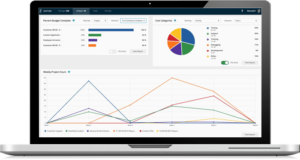What Is Resource Management and Why is it Vital?
Resource management defined:
The process of making sure a business has everything it needs to operate at its best and that the required people, materials and other resources are allocated and scheduled in the most efficient and effective manner possible.
Taken at face value, resource management can be defined rather simply — it is the effective management of the resources that a particular company needs. However, when we explore this concept in more detail, we see that it is not only more complex than it first appears, but also vital for effective project management and business operations.
This is because your resources, and their allocation, are so vital to everything your company does. If you need to handle an easy task with a short completion schedule, you don’t want to expend too many resources or over-allocate your teams to this job so other areas of your business may suffer. Similarly, on larger scale projects, you can’t afford a shortfall in terms of resources. In this light, resource allocation becomes one of the most important aspects of project management.
The Different Disciplines of Resource Management
Truly effective resource management — the kind that gives businesses the foundation they need to really succeed — is a nuanced job. There are many different tasks that must be completed before success can be achieved, which resource management software can help you manage. We’ve explored some of the key disciplines of an effective resource management strategy below.
Resource Allocation
Resource allocation involves understanding the resources available to your organization and then deciding which tasks you can complete based upon these available resources.
For example, you may discover that your business has an urgent task that needs to be completed without delay — for example, rolling out in-store point of sale materials ahead of an imminent product launch. And, thanks to pre-planning, all the resources you need are already at your fingertips.
It is up to your allocation team to ensure the relevant departments have the materials, personnel, and support they need to get the job done.
Resource Scheduling
Resource scheduling is very similar to allocation in that a need is identified and assessed, and then resources are delivered to meet this need. However, unlike with resource allocation, where resources are allocated to a certain project, department, or another area, resource provision is handled in terms of time.
This means looking into the upcoming job pipeline and recognizing when particular resources will be used. Perhaps at some points in the near future, almost no resources will be required because projects will be completed or not yet begun. At other times, resource-intensity will be high. Resource schedulers need to assess this.
Resource Leveling
It is likely that your business will have areas of underused or inefficiently used resources that are not being deployed to their full potential. Resource leveling involves conducting an assessment and then trying to make the most of existing resources within the business.
With resource leveling, businesses stand to get the greatest benefit from resource management because, when performed well, it reduces the need to bring in further resources at a cost, much of which may also become wasted.
Leveling also makes it easier to plan for the future. You can work out in advance how you will allocate your resources and work toward understanding how your business’s capacity will develop in both the short and long term. This extends to your personnel also and helps you to plan how your staff will be utilized in a way that best reflects their skills.
Forecasting and Predicting
Resource scheduling involves looking to the future, but forecasting and predicting go somewhat further. These disciplines utilize data currently available to make projections regarding resource usage in the future and then aim to put provisions in place to support these needs as and when they emerge.
Why Is Resource Management So Critical?
- An effective Plan B — Having your resources organized and ready to go makes you that much more flexible. This means, in the inevitable situation that a change of approach is required, you will be able to shift seamlessly to your Plan B.
- Cross-organizational visibility — It’s difficult when department teams don’t know what other departments are doing with their resources. This is when paranoia and acrimony begin to set in. Proper resource management increases visibility on a wide scale, reducing this risk.
- Employee satisfaction levels increase — Everyone wants to exercise their unique skills and to work on tasks they enjoy. By managing resources in the right way, you are making sure that this is the case.
- Greater efficiency — Your business keeps on running smoothly by optimizing how resources are used.
- Reduced wastage — Wasted resources are bad news for your bottom line. Reduce or even eliminate this by having the proper resource management processes in place.
 To find out more about why resource management is so important and about how you can get the best out of it using resource management software, download the whitepaper The Benefits of Resource Management Software. In this whitepaper, you’ll find out how resource management software will help you:
To find out more about why resource management is so important and about how you can get the best out of it using resource management software, download the whitepaper The Benefits of Resource Management Software. In this whitepaper, you’ll find out how resource management software will help you:
- Integrate your project plans with actuals
- Get critical insights into resource availability
- Gather real, easily-consumable data to report to the C-suite
Let’s Get Started. Book a Demo Today.
Journyx helps you track time for projects, payroll, and more. Learn how Journyx can help you use time to your advantage in your business.



